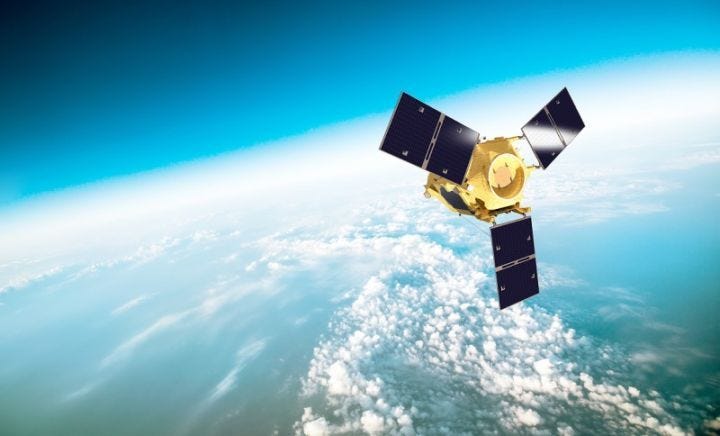Middle East Space Roundup: 16 to 22 April 2023
A summary of all the space news in the Greater Middle East over the past week, powered by AzurX

The following are the major space developments in the Greater Middle East region tracked by Middle East Space Monitor over the past week:
17 April 2023
Azerbaijan’s Azercosmos is one of the first national space agencies to sign up to the Axiom Space Access Program, a new service line for aspiring space powers offered by the U.S. space company Axiom Space. The Axiom Space Access Program is essentially a ‘space programme in a box’ and offers four tiers of services to prospective clients. In tier one Axiom Space provides technical advice and insight to clients and provides priority access to upcoming space missions. In tier two Axiom Space helps country clients with their space research and development activities. In tier three Axiom Space offers astronaut training and human spaceflight services, and in tier four country clients are offered the opportunity to co-develop parts of Axiom Space’s planned commercial space station. According to Space News Azercosmos has signed up to the tier two service offering to develop satellite solutions and encouraging Azerbaijani students to pursue space research and development activities. The Israeli not-for-profit space education foundation, the Rakia Mission – a cooperative endeavour by The Ramon Foundation and the Israel Space Agency (ISA), has also signed up but it is not known for which tier. In April 2022 the Rakia Mission’s Eytan Stibbe became Israel’s second ever astronaut and was trained by, and launched to the International Space Station, by Axiom Space on board its AX-1 mission. In May 2023 Axiom Space’s AX-2 mission will launch two astronauts from Saudi Arabia to the International Space Station.
19 April 2023
A researcher at Bahrain’s National Space Science Agency (NSSA) reveals an innovative technique utilising Earth observation nanosatellite optical sensors and artificial intelligence (AI) for detecting and tracking very small pieces of space debris in low-Earth orbit (LEO). The nanosatellites detect debris with their optical sensors and the AI algorithm tags the debris piece noting its size and orbit. The data is stored on the nanosatellite until it can be transmitted to Earth where it is added to a catalogue of space debris.
20 April 2023
Azerbaijan’s Azercosmos announces that it has lost contact with its AzerSky Earth observation satellite after the space agency and the satellite’s manufacturer, Airbus Defence and Space, repeatedly tried to reacquire communications with it. The AzerSky Earth observation satellite was unexpectedly lost a year earlier than its planned operational lifetime according to reports. AzerSky was originally operated by Airbus Defence and Space as SPOT-7, a civil high-resolution Earth observation satellite with a panchromatic resolution of 1.5 metres and a multispectral resolution of six metres, and was originally launched in June 2014 and handed over to Azercosmos in December 2014, who renamed it AzerSky. The AzerSky satellite is the only high-resolution Earth observation system in the Azercosmos fleet.

The India, Israel, United Arab Emirates, and United States (I2U2) Group’s Business Forum held a meeting in Washington, DC, where representatives from the four countries signed a memorandum of understanding (MoU) to create a joint business coalition to promote I2U2 initiatives in combating climate change, dealing with food, energy, and water security, transportation, healthcare, and space technologies. The MoU enables think tanks and universities from I2U2 member states to produce research studies and White Papers on I2U2 initiatives to include civil and commercial space cooperation.
The director-general of the Islamic World Educational, Scientific and Cultural Organization (ICESCO), Dr. Salim Al-Malik, met with various international space officials while attending the 38th Space Symposium held in Colorado Springs, Colorado, United States. The Space Symposium is one of the largest and most notable events on the international space calendar, and while there Dr. Al-Malik met with executives from companies such as Blue Origin and Lockheed Martin as well as with Dr. Pascale Ehrenfreund, the President of the International Space University in Strasbourg, France. Dr. Al-Malik discussed possible space and satellite training and scholarship opportunities in his meetings to support young Muslim students seeking careers in space.
21 April 2023
Several Azerbaijani and Israeli news outlets reveal that Azerbaijan has selected Israel Aerospace Industries (IAI) to build and launch two high-resolution Earth observation satellites. The deal is said to be valued at $120 million for the two satellites, but no other details are forthcoming from the Azerbaijani and Israeli governments, or from IAI, at the time of publication. The first suggestions that the deal was in the offing occurred during the official visit to Azerbaijan by Israel’s foreign minister, Eli Cohen, when the Israeli foreign ministry alluded to the deal in one of its press briefings. By sheer coincidence, and within days of the revelation of the satellite deal, Azercosmos announced that it lost contact with its only high-resolution Earth observation satellite AzerSky.
Be sure to catch up with space activities in the region in the next edition of Middle East Space Monitor’s space roundup!

